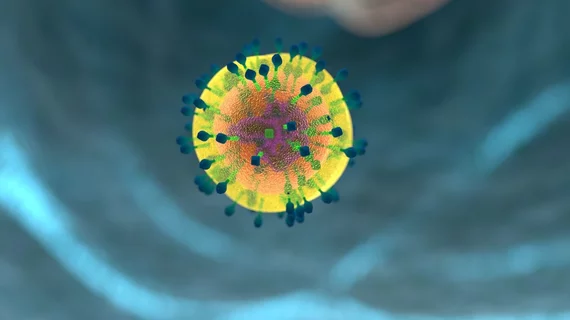Neurological symptoms present in patients with COVID-19
Some patients diagnosed with COVID-19 experience neurological symptoms, most commonly an altered mental state and stroke.
That’s according to a recent study of more than 700 patients infected with the virus between Feb. 29 and April 4, published in Radiology. A majority (59%) of patients had an altered mental state, with 15% experiencing serious neurological symptoms requiring brain or spine imaging.
Lead author Abdelkader Mahammedi, MD, an assistant professor of radiology at the University of Cincinnati, added that 31% of individuals suffered a stroke and that such findings should help physicians understand the virus’s impact on the central nervous system.
“To date, this is the largest and first study in [the] literature that characterizes the neurological symptoms and neuroimaging features in COVID-19 patients,” Mahammedi, also a UC Health neuroradiologist, said in a statement. “These newly discovered patterns could help doctors better and sooner recognize associations with COVID-19 and possibly provide earlier interventions."
A total of 725 patients from three major Italian institutions were included in the study. Imaging workup for most (99%) individuals included a brain CT scan, with 18% undergoing brain MRI and 16% receiving a head and neck CT.
An altered mental state was the most common neurological finding and was more prevalent in older adults, the authors noted. Additionally, 31% experienced a stroke, 12% suffered from headaches, 9% had a seizure and 4% reported dizziness.
"Of these 108 patients, 31, or 29%, had no known past medical history. Of these, aged 16 to 62 years, 10 experienced stroke and two had brain bleeds," Mahammedi added. "Seventy-one, or 66%, of these patients had no findings on a brain CT, out of which 7 of them (35%)…showed abnormalities."
Mahammedi and colleagues concluded that the neuroimaging features of patients with COVID-19 vary, and said the topic “definitely needs more research.”
"Currently, we have a poor understanding of the neurological symptoms in COVID-19 patients, whether these are arising from critical illness or from direct central nervous system invasion of SARS-CoV-2,” he added. “We hope further study on this subject will help in uncovering clues and providing better interventions for patients."

